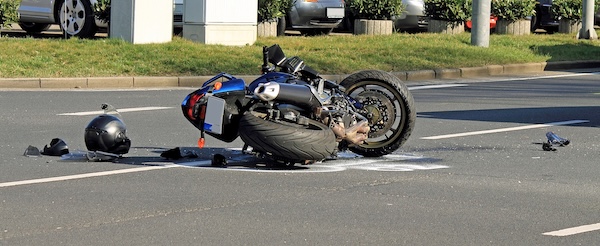The Importance of Helmet Safety
Motorcycle riding can be an exhilarating experience, offering a sense of freedom and adventure on the open road. However, it also comes with significant risks, especially when it comes to head injuries. According to the Motorcycle Safety Foundation, helmets are the most effective form of protection for motorcyclists, significantly reducing the risk of fatal injuries in a crash.
In North Carolina, the law mandates that all motorcycle operators and passengers wear helmets to help ensure their safety. But what happens if you’re involved in a motorcycle accident and weren’t following the helmet requirement? Understanding motorcycle helmet laws and how they affect accident claims is essential for every rider, and consulting with an experienced motorcycle accident lawyer can help you navigate the complexities of your case.
In some states, riders over 21 can forgo wearing a helmet if they have completed an approved motorcycle safety course or are covered by a health insurance plan that offers at least $10,000 in medical benefits for motorcycle-related injuries.
Whether you’re a seasoned motorcyclist or a novice rider with an instructional permit, knowing how these laws apply to you can have a major impact on the outcome of your claim. In this post, we’ll explore the specifics of helmet laws in North Carolina and how failing to follow them could influence the success of your motorcycle crash claim.
What are Motorcycle Helmet Laws?
Motorcycle helmet laws are regulations that mandate the use of protective headgear for motorcycle operators and passengers. These laws are designed to enhance rider safety by reducing the risk of head injuries in the event of a crash. The specifics of these laws can vary significantly by state and country. In the United States, for instance, 49 states and the District of Columbia have enacted some form of motorcycle helmet law. Among these, 21 states have implemented a mandatory helmet law that requires all riders, regardless of age or experience, to wear a helmet.
The primary goal of these laws is to ensure that riders wear helmets that meet specific safety standards, thereby providing maximum protection. Wearing a motorcycle helmet is not just a legal requirement in many places; it is a critical safety measure that can save lives and reduce the severity of injuries in accidents.
Types of Motorcycle Helmet Laws
Motorcycle helmet laws can be categorized into three main types, each with different requirements and implications for riders:
- Universal Helmet Laws: These laws require all motorcycle operators and passengers to wear a helmet, regardless of their age or experience. States with universal helmet laws aim to provide the highest level of protection for all riders. For example, North Carolina enforces a universal helmet law, ensuring that everyone on a motorcycle wears protective headgear.
- Partial Helmet Laws: Partial helmet laws mandate helmet use only for specific groups of riders, such as minors or novice riders. These laws recognize the increased vulnerability of younger and less experienced riders. States like South Dakota and New Mexico have partial helmet laws that apply to riders under a certain age or in specific situations.
- No Helmet Laws: Some states, like New Hampshire, do not have any helmet requirements for adult riders. In these states, wearing a helmet is left to the discretion of the rider. However, even in the absence of a legal requirement, wearing a helmet is strongly recommended for safety reasons.
Understanding the type of helmet law in your state is crucial for compliance and safety. Whether you are a seasoned rider or a novice, knowing and following these laws can significantly impact your safety and legal standing in the event of an accident.
What are North Carolina’s Helmet Laws?
North Carolina enforces a mandatory helmet law, which means that all motorcycle riders—including both operators and passengers—must wear protective headgear while riding. This law is designed to protect riders from severe head injuries in the event of a motorcycle crash. Studies from the Motorcycle Safety Foundation have shown that wearing a helmet can reduce the risk of head injuries by up to 37%.
This law applies to all motorcycle riders and passengers, ensuring that everyone is as protected as possible while on the road.
Key Points About North Carolina’s Helmet Law:
- Helmet Requirement: All riders, including both operators and passengers, must wear helmets.
- Safety Impact: Helmets reduce the risk of serious or fatal head injuries in crashes.
- Applies to All Riders: The helmet law applies to all types of motorcycles and motorized bicycles.
Motorcycle Endorsement and Safety Requirements
In addition to the helmet law, all riders in North Carolina must have a valid motorcycle endorsement on their driver’s license. This endorsement ensures riders have the proper training and knowledge of motorcycle safety, including the helmet law and the standards set by the Department of Motor Vehicles to ensure that helmets meet safety criteria and that riders are equipped properly for protection while operating their motor vehicles.
What Riders Must Do:
- Complete Motorcycle Training: Riders must complete a state-approved safety course to obtain a motorcycle endorsement.
- Understanding the Helmet Law: Riders are trained on helmet requirements and other safety rules during the endorsement process.
- Novice Riders: New riders must successfully complete safety courses before they can get their motorcycle endorsement.
Exceptions to the Helmet Law
While federal law doesn’t mandate helmets nationwide, individual states have the power to create their own laws. North Carolina has one of the strictest helmet laws, requiring helmets for all riders, regardless of age or experience. However, other states have different approaches.
States with Different Helmet Laws:
New Hampshire: No helmet requirement for adult riders.
South Dakota and New Mexico: Helmet laws may only apply to riders under a certain age or in specific situations.
North Carolina and South Carolina: Strict helmet laws, requiring helmets for all riders, regardless of age or experience.
In some states, safety equipment must be approved by the Secretary of Safety and Homeland Security, emphasizing the government’s role in overseeing safety regulations.
It’s important for riders to be aware of North Carolina’s helmet law, especially when traveling from other states, as non-compliance can lead to legal penalties and increased risk of injury.
How Helmet Laws Affect Motorcycle Accident Claims
The helmet requirement in North Carolina plays a significant role in motorcycle accident claims. Not only does it affect the safety of the rider, but it also has a direct impact on the legal outcome and compensation a rider may receive following a crash. If a rider is involved in an accident and is not wearing a helmet, it could substantially affect their ability to recover damages.
Contributory Negligence in North Carolina
North Carolina follows the contributory negligence rule, which can be especially important in the context of motorcycle accidents. Under this rule, if a rider is found to be even partially at fault for the accident, they may lose their right to compensation.
- Failure to Wear a Helmet: If a rider does not wear a helmet and this failure is determined to have contributed to the severity of their injuries, they may be denied compensation. Helmet laws also apply to passengers riding with certain types of drivers, emphasizing age restrictions and specific licensing situations.
- Impact on Claims: For instance, if a rider sustains serious head injuries and it’s determined that wearing a helmet would have reduced the injury, the rider may be considered partially responsible for their own condition, even if the other driver was primarily at fault. This can lead to the rider not being eligible for compensation.
This highlights how crucial the helmet law is in motorcycle accident claims in North Carolina. Non-compliance could result in no compensation, even if the other party was largely at fault.
Severity of Injuries and Legal Impact
Not wearing a helmet can directly affect the severity of injuries a rider sustains in a crash. Helmets do not eliminate the possibility of injury, but they are proven to reduce the severity of head trauma, particularly in high-speed accidents.
- Crash at Maximum Speed: In accidents where riders are traveling at higher speeds, head injuries can be especially severe. If the rider is not wearing a helmet, the extent of the injuries could be significantly worse.
- Determining Causation: Insurance adjusters, as well as lawyers, will often look at whether the rider was wearing a helmet to determine if the lack of protection aggravated the injuries. For example, a rider may have sustained a concussion or skull fracture that could have been avoided or minimized had they been wearing a helmet. This can affect the amount of compensation they are awarded, as the severity of injuries often dictates the damages.
Insurance Implications for Riders Not Wearing Helmets
Insurance companies treat the failure to comply with helmet laws as a form of negligence, which can have serious implications for the outcome of a motorcycle accident claim.
- Reduced Compensation: If it is determined that the rider’s failure to wear a helmet contributed to the severity of their injuries, insurance companies may offer a reduced settlement. Even if the other driver was at fault for the crash, insurance companies may argue that the rider’s own actions—such as not wearing a helmet—played a role in the outcome.
- Negligence Perception: Insurance adjusters may argue that the rider’s failure to wear a helmet makes them partially responsible for the injuries sustained, thereby lowering the compensation they receive. In some cases, this can even lead to a denial of compensation entirely.
Riders who fail to wear helmets may also face challenges in securing medical reimbursement or financial recovery for lost wages and other expenses. Insurance companies may be less inclined to provide full compensation when the rider has violated a basic safety law, especially when the violation contributes directly to the injuries sustained in the crash.
Impact on Legal Cases
In addition to the impact on insurance settlements, helmet non-compliance can also affect motorcycle accident lawsuits.
- Court’s Perspective: If the case goes to trial, the court will consider the rider’s failure to comply with the helmet law when determining liability. Even if the other party was primarily at fault, the rider’s own negligence in not wearing a helmet can reduce the damages awarded.
- Comparative Fault: In cases where comparative fault is applied, the court will assess how much responsibility each party holds in the accident. If the rider is found to have contributed to their own injuries by not wearing a helmet, the court may reduce the damages based on their level of fault. This can lead to a significant decrease in the compensation they are entitled to.
The Role of Helmet Evidence in Motorcycle Accident Claims
In motorcycle accident claims, wearing a helmet can often be the difference between life and death. According to the Motorcycle Safety Foundation, riders who wear helmets are significantly less likely to suffer fatal injuries in a crash. Therefore, the absence of a helmet in an accident can have a significant impact on the legal outcome of the case.
Head Injuries and Causation
Head injuries are a leading cause of death and permanent disability in motorcycle accidents. The Motorcycle Safety Foundation reports that helmets reduce the risk of head injuries by up to 69%. This information is crucial in motorcycle accident claims, as proving that a rider’s head injury was avoidable by wearing a helmet can influence the case’s outcome.
Expert Testimony
Medical experts may be called to testify about the impact of not wearing a helmet in motorcycle accidents. Their testimony can play a key role in determining whether wearing a helmet would have prevented or reduced the severity of the injuries sustained during the crash. This evidence can be pivotal in establishing the extent of liability and the potential for recovery in a claim.
Motorcycle Accident Claim Process
If you are involved in a motorcycle accident, following the proper claim process is essential to ensure you receive fair compensation for your injuries and damages. Here are the steps to follow:
- Seek Medical Attention: Your health and safety are the top priority. If you are injured, seek medical attention immediately, even if the injuries seem minor. Prompt medical care can prevent complications and provide documentation for your claim.
- Report the Accident: Contact the police and report the accident. Obtain a copy of the accident report, as it will be a crucial piece of evidence in your claim.
- Notify Your Insurance Company: Inform your insurance company about the accident as soon as possible. Provide them with a copy of the accident report and any other relevant information.
- Gather Evidence: Collect evidence from the accident scene, including photos, witness statements, and medical records. This evidence will support your claim and help establish liability.
- File a Claim: Submit a claim with your insurance company or the at-fault party’s insurance company. Ensure that all necessary documentation is included to avoid delays.
- Negotiate a Settlement: Work with the insurance company to negotiate a fair settlement. Be prepared to provide additional evidence and argue for the compensation you deserve.
- Go to Court: If a settlement cannot be reached, you may need to file a lawsuit and go to court to seek compensation. An experienced attorney can help guide you through this process and represent your interests.
Following these steps can help ensure that you receive the compensation you need to cover medical expenses, lost wages, and other damages resulting from the accident.
Other Factors Impacting Motorcycle Accident Claims in North Carolina
While helmet laws are crucial, other factors can also influence the outcome of motorcycle accident claims in North Carolina. These include:
- Road Conditions and Vehicle Users: Poor road conditions or negligence by other motor vehicle users can contribute to motorcycle accidents. Despite these factors, wearing helmets can still reduce the severity of injuries in such situations. For example, a fatal motorcycle accident that occurred on a Thursday night highlighted the severity of the crash and its significant impact on the claim.
- Novice Riders: Riders who have not completed their motorcycle safety training or are riding without proper licensing may encounter difficulties with their claims. Novice riders are often more vulnerable in crashes, making helmet use even more critical for their protection.
- Accident Location: The location of the accident, such as Neuse Road in Raleigh, may also impact the claim, particularly if it occurs at an intersection or other high-risk area where accidents are more likely.
How Motorcycle Helmet Laws Save Lives
Motorcycle helmets serve as a rider’s most critical line of defense against head injuries in the event of a crash. The primary goal of helmet safety is to prevent traumatic brain injuries (TBI), which are the leading cause of death and permanent disability in motorcycle accidents. Helmets achieve this by absorbing and distributing the force of an impact, reducing the likelihood of severe injury to the skull and brain.
The Science Behind Head Trauma Prevention
In a motorcycle crash, the rider’s head is exposed to significant forces. Without a helmet, these forces can cause brain damage, skull fractures, and even fatal injuries. Helmets are designed to protect the rider’s head in the following ways:
- Absorbing Impact: The outer shell of a helmet is made of hard materials that help disperse the energy from the impact over a wider area. This reduces the direct force applied to the skull, lessening the chance of a severe injury.
- Padding and Cushioning: Inside the helmet, layers of foam act as a shock absorber, helping to slow the deceleration of the rider’s head. The more the helmet slows down the impact, the less force is transferred to the brain, reducing the likelihood of brain injuries.
- Protecting the Skull: Helmets provide a crucial protective barrier for the skull, helping to prevent fractures. Skull fractures can lead to brain hemorrhages or other life-threatening conditions, but helmets significantly lower the risk of these outcomes by providing a hard shield against external forces.
Motorcycle Helmet Safety Standards
Motorcycle helmets must meet specific safety standards to be considered effective in protecting riders. In the United States, helmets must comply with the safety standards set by the Department of Transportation (DOT) or the Snell Memorial Foundation. These standards ensure that helmets provide adequate protection in the event of a crash. Key safety standards include:
- Impact Absorption: Helmets must be able to absorb and distribute the force of an impact, reducing the risk of head injuries. The outer shell and inner foam layers work together to dissipate energy and protect the rider’s head.
- Penetration Resistance: Helmets must resist penetration from sharp objects, such as rocks or glass, that could cause serious injuries. The materials used in helmet construction are designed to withstand such impacts.
- Retention System: A secure retention system, such as a chin strap, is essential to keep the helmet in place during a crash. The retention system must be strong and reliable to prevent the helmet from coming off.
- Field of Vision: Helmets must provide a clear and unobstructed field of vision for the rider. This ensures that riders can see their surroundings and react to potential hazards.
- Labeling: Helmets must be labeled with the manufacturer’s name, model number, and safety certification. This information indicates that the helmet meets the required safety standards.
Choosing a helmet that meets these safety standards is crucial for your protection. Look for helmets that are certified by reputable organizations such as the DOT or Snell Memorial Foundation to ensure you are getting a high-quality product. Wearing a certified helmet can significantly reduce the risk of serious injuries in a motorcycle crash.
Frequently Asked Questions (FAQ)
Do I have to wear a helmet while riding a motorcycle in North Carolina?
Yes, North Carolina law requires all motorcycle operators and passengers to wear helmets while riding. This helmet requirement applies to all motorcycles, regardless of the rider’s age or experience.
What happens if I don’t wear a helmet during a motorcycle accident?
Failing to wear a helmet can significantly affect your motorcycle accident claim. Under North Carolina’s contributory negligence rule, not wearing a helmet may be considered negligence, potentially reducing or eliminating your ability to recover compensation.
Can wearing a helmet reduce the severity of my injuries in a crash?
Yes. Helmets are proven to reduce the severity of head injuries, lowering the risk of fatalities and permanent disabilities. According to the Motorcycle Safety Foundation, wearing a helmet can reduce head injury risks by up to 69%.
Does the law apply to motorcycle passengers as well?
Yes, both the motorcycle operator and passengers are required to wear helmets in North Carolina. The law covers anyone riding on a motorcycle, not just the rider.
Are there any exceptions to North Carolina’s helmet law?
No, there are no exceptions to the helmet law in North Carolina. All riders and passengers must wear helmets, regardless of age, experience, or the type of motorcycle being ridden.
How does the location of the accident affect my claim?
The location of the accident can impact your claim. For instance, if an accident occurs in high-risk areas like busy intersections or poorly maintained roads, the details of the location may influence the liability assessment and potential compensation.
If I wasn’t wearing a helmet, can I still file a claim for my injuries?
Yes, you can still file a claim, but not wearing a helmet may reduce your chances of receiving full compensation. The failure to wear a helmet can be seen as contributory negligence, which could lower your potential settlement or even prevent you from receiving any compensation, depending on the circumstances.
Stay Safe and Protect Your Rights Today
Understanding and following motorcycle helmet laws is essential for every rider’s safety on the road and legal protection. In North Carolina, motorcycle helmet laws require all riders, including motorcycle passengers, to wear protective headgear. Helmets are proven to reduce the risk of serious injury in a motorcycle crash, and wearing one not only keeps you safe but also helps ensure you can seek compensation if you’re injured. At NC Car Accident Lawyers, we’re here to guide you through the legal process and protect your rights.
Laws vary between states, so it’s important to know the specific motorcycle helmet laws in North Carolina and beyond. In states like South Carolina and New Hampshire, helmet laws are different, which can have a big impact on your motorcycle accident claim.
If you or a loved one has been involved in a motorcycle accident, contact us at NC Car Accident Lawyers today. Our experienced team understands how helmet laws and motorcycle safety affect your claim. Call 864-561-6247 now to speak with an attorney who will protect your rights and fight for the compensation you deserve.









